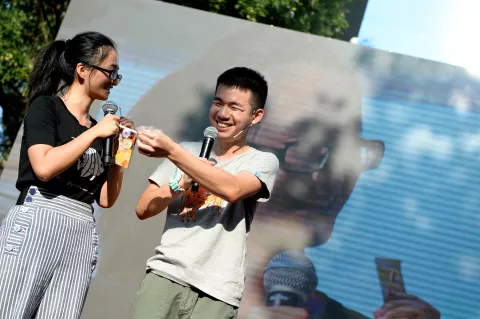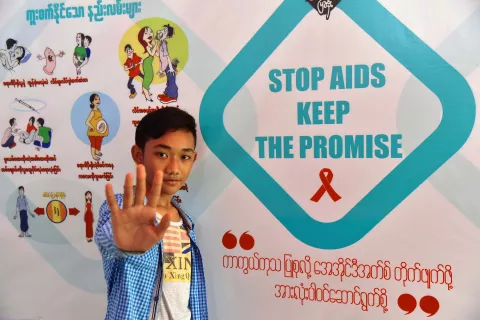One mother reaching out to other mothers
We should not wait until it's too late
- Available in:
- 中文
- English
Juhar understands women who are too shy or boxed in by tradition to seek help. She also understands the difference one woman reaching out to them can make.
“I have a healthy son thanks to Juhar, who insisted that I should go to the MCH hospital for an HIV test, get ARV treatment and be followed up till delivery,” explains by Yan, a 22-year-old woman living with HIV, who now works with Juhar and eight other peer educators.
Juhar lives in a small city in West China, where the HIV rate among people getting married is estimated at 2.5 per cent. She says it is common to see young people and children die from AIDS even though the government provides drugs for treatment and services for the prevention of mother-to-child transmission (PMTCT) free of charge.
“In our community, people believe that the healthiness of children is a gift of God and preventive measures are often ignored. Most women do not go to the hospital for antenatal care and delivery because they are very shy, and they do not want their body to be seen by people other than their husband. And there is the belief that one should not let blood go out of our house,” she says. “Young people prefer to hide their HIV status. They often decide not to take the treatment and change their address and phone numbers to avoid follow-up by the local disease control authority.”
Juhar's husband died three years ago, leaving her to raise their three children alone. When her husband was dying in hospital, she was asked by local disease control staff to take an HIV test, which showed her to be in a late stage of AIDS. She decided to try the ARV treatment because she didn't want her three children to become orphans, like other children in their neighbourhood. The treatment proved successful, and she thrived. The Maternal Child Health (MCH) hospital asked Juhar to engage as a peer outreach educator to use her experience to encourage other women in her community to test for HIV, to consider prevention and to take the treatment if required.
Although it is hard to deal with traditions, Juhar agreed to work with the local MCH doctors and nurses in the Community Care for PMTCT Project, which the Government and UNICEF support, to help save other mothers and children.
“We should not wait until it is too late! I saved more than 80 women and children!” says Juhar. She is proud of her achievement but recognizes it would not have been possible without the support of the MCH hospital and UNICEF.
Note: The names of the HIV/AIDS affected women are changed in this article to protect their privacy.



